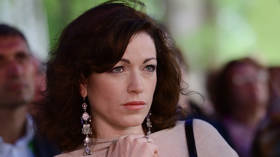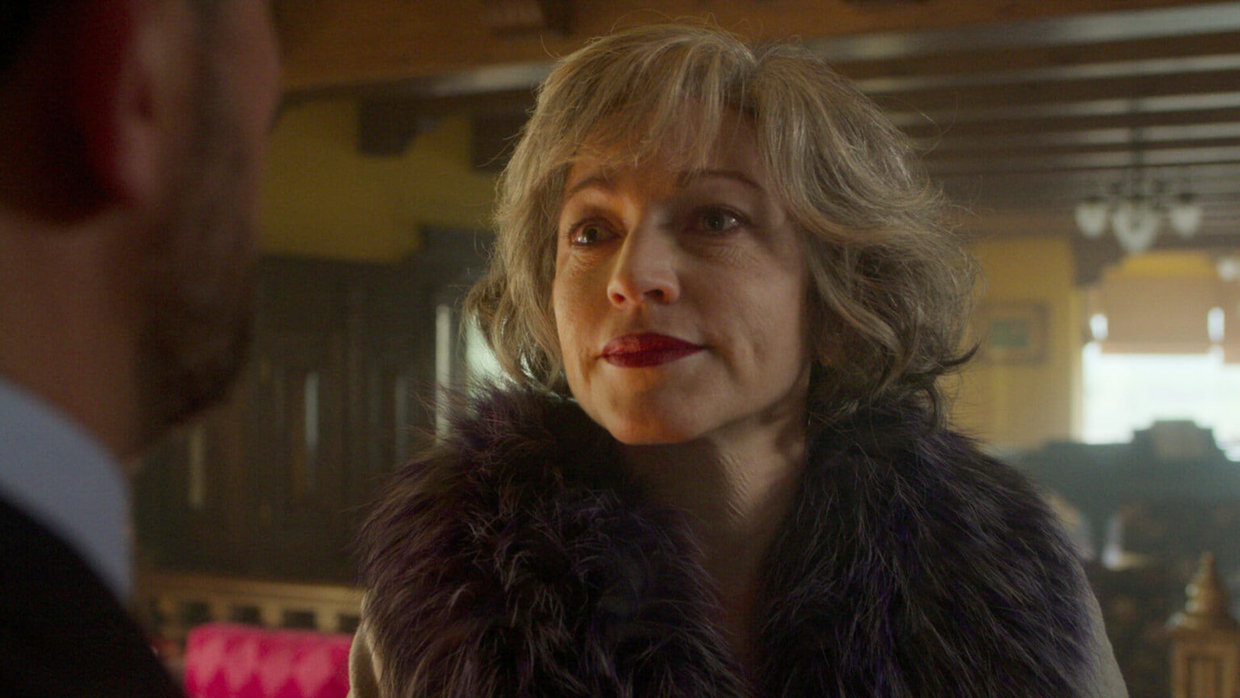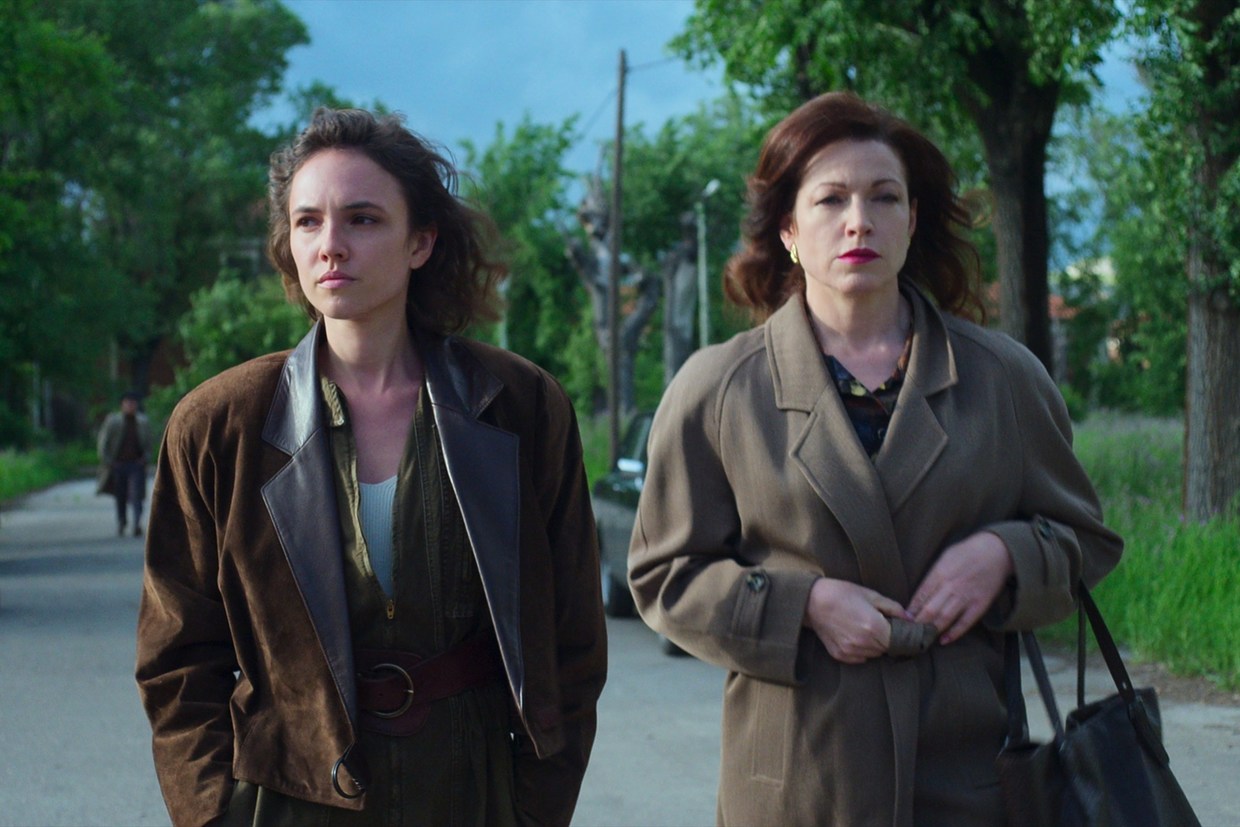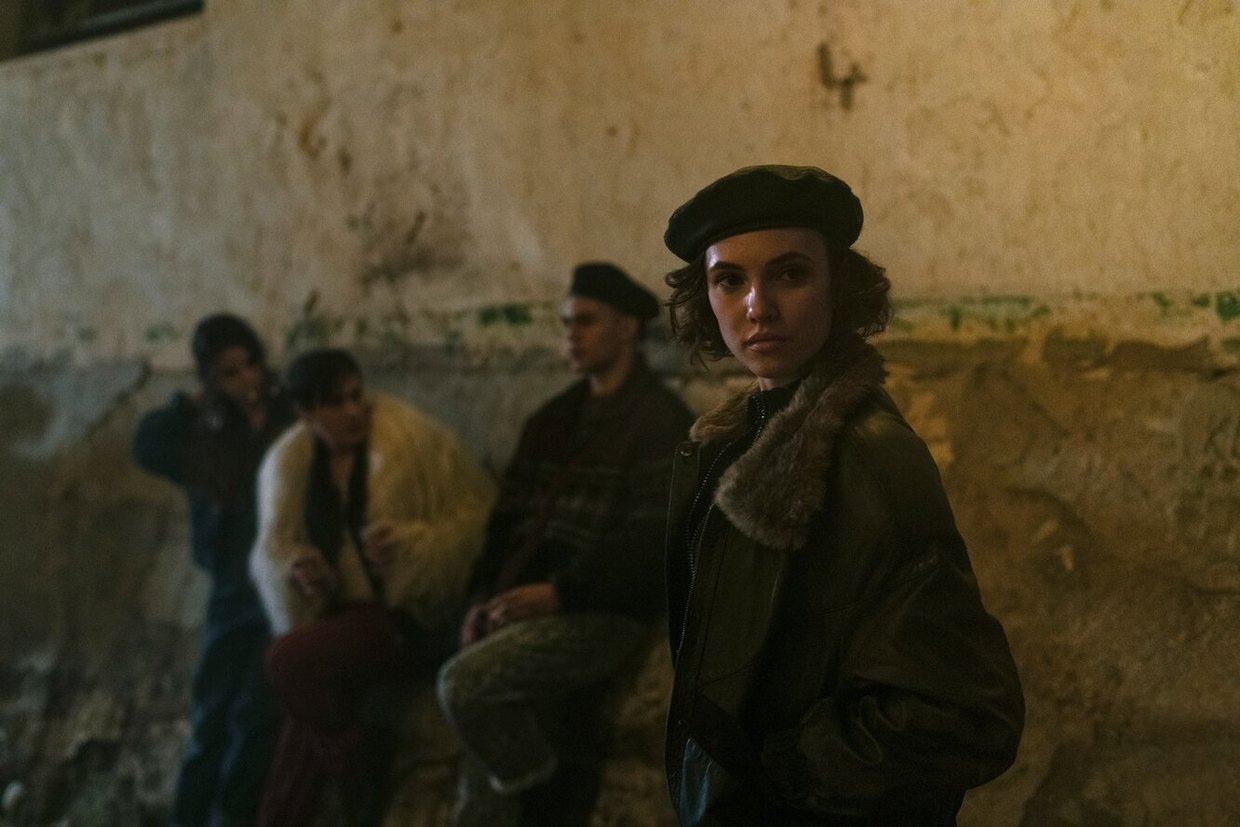‘Nothing is black & white, there’s ambiguity’ – In From the Cold actor on what she likes about the series


Netflix’s In From the Cold is currently in the top ten most popular series on the service. One of the lead roles – that of Svetlana Petrova – was played by Russian actor Alyona Khmelnitskaya. In an exclusive interview with RT, she spoke about the shoot, her experience of working abroad and what makes this show different from many other movies about Russian spies.
Q: I can’t wait to talk to you about In From the Cold. I know that you got this role through your agent, you sent in a self tape for the audition.
A: Yes.
Q: Did you expect a response, were you anxious? Or did you just record it and forget about it?
A: I recorded the tape and then, of course, I tried to forget it, to delete the file from my brain. But…To be honest, I didn’t really believe it could happen. I am a realistic person. Pretty romantic, but still. I was 49 at the time. I thought, “Come on, there must be scores of Russian actors who speak English perfectly. Why would they pick me? I don’t even look particularly Russian.” I thought the Americans were looking for a stereotypically Slavic face. And I am anything but that.
Q: But they did have some requirements, right? A woman in her forties…
A: Even older than that – closer to fifty. ‘Eastern European type,’ it said (almost like a dog breed, you know, the East European Shepherd). And they also described, well, the character’s personality.
I think my agent sent them some photos, and then I got the script for the audition. There were two scenes, one in Russian and one in English. I chose the shorter one, and it was in English. I recorded the piece – and I wouldn’t be able to do it without lots of help from my daughter, who speaks English fluently. She was very helpful, she constantly said, “Take it easy, Mom, it’ll be alright, you can do it.” But I was freaking out. I found that speaking a little English to get around is nothing like playing an actual scene – it’s a completely different story.
So I finally recorded the tape at home, at 3am, when the whole family was sleeping.
Q: How long did you wait for a response?
A: It wasn’t long at all: they came back to me in about two weeks. Maybe even earlier. They were clearly interested. And then we started discussing schedules and all that. That was when I started to believe this whole thing was for real.
Q: What were your first thoughts?
A: No thoughts. My agent and my daughter had a lot of laughs about this situation – the thing is, I was supposed to be shooting for [Russian TV show] Dancing with the Stars at the same time...
Q: That’s a tough choice!
A: It wasn’t really a choice, of course. But it was hilarious. Just like the joke: “Hello! Who is this? Oh, sorry, Mr Spielberg, I’m all booked, it’s that time of year, you know, every party needs a Santa…” And I’m not saying that Dancing with the Stars was not important: I had been preparing for that project, I was so excited about it, and everything was set, while this new engagement was still up in the air... At that time, I thought the shooting of In From the Cold was never going to happen. I don’t know why.

Q: Must have been a psychological defense mechanism. And when did the excitement finally catch up with you?
A: Well, of course, I was excited when I got the callback after the audition. And when they told me I had been approved... I was ecstatic! I told the news to everyone I spoke to. So I frantically started practicing English: I hired a teacher – a native speaker – and immersed myself in the language.
An actor can memorize lines in any language, even in Chinese. But what is it going to feel like on set? Am I actually going to be working in a foreign language?
Besides, I was told right from the start that this project would be a long one, that we’d have to spend three months there. And so we did – but that was later. This whole story started before the pandemic. In 2020, I was already in Madrid and I was planning to stay there for the entire shoot. But a week later our producer gathered everyone and told us that the borders were closing, the project was being put on ice, and that we had to leave the country within 24 hours. Everyone flew back home, and I went back to Moscow. Nobody knew what to expect. I remember thinking, “I knew it! I knew something would get in the way. If it’s not one thing, then it’s another. The last thing I need right now is a pandemic.”
As everyone was leaving, we had no idea what to expect. How long will the pandemic last? Will filming even be allowed? If so, when? And in what way? We never knew such a thing was even possible or that a virus like that could affect the entire planet. We flew back home with a feeling of uncertainty and spent the next year in limbo. We could only wait for the shooting to resume – or not.
Q: So you had that entire year to prepare.
A: An entire year, yes. I had some time to get ready, instead of taking it all on at once.
Q: How did it turn out in the end? Your English, communicating with the film crew, working with foreign filmmakers you know nothing about…
A: It was better than I could have imagined! They are all very open-hearted and friendly people, supportive and understanding. The showrunner was Adam Glass, creator of the iconic series Supernatural. He’s a very down-to-earth man, and a wonderful, lovely person. He would always comment how amazing and talented the cast is. “Alyona, your English is much better than you think,” he’d say. My anxiety went away pretty quickly, because I felt a lot of support from Adam.
Also, they wanted the project to be inclusive and international. While this is an American series, the filming crew were all from Spain.

Q: And all the shooting was done in Madrid, right?
A: All of it, yes. There was a real energy to the place.
Adam said he “wanted everything to feel real.” The show is not about ‘good guys’ versus ‘bad guys.’ It’s a spy detective story. All the characters are...
Q:... complex.
A: Complex, yes – on both sides.
Adam wanted it to feel true to life, so he asked us to speak normal Russian, the way we would talk naturally, without clichés. Sometimes you’re watching a show and you think, “My God, that’s so fake! People don’t talk or act like that…” [Russian actor and colleague] Stasya Miloslavskaya and I changed a lot of things, and the filmmakers consulted with us. We explained that Russians don’t talk like this or that, that we say things differently. They always listened to our comments: “Thank you so much, that's exactly what we want – for the show to feel real.” And we tried our best to sound good in Russian-speaking scenes, we didn’t want to embarrass ourselves.
Q: You participated in both the European and the Russian parts of the story. Were they both filmed in Madrid?
A: Yes, the Moscow part was also shot in Madrid.
Q: They say foreign filmmakers are more disciplined [than Russian ones], that shifts always end on time and no one is forced to work overtime. Is that true?
A: It is.
The show has lots of stunts and fighting scenes. A great deal of VFX, too: there are parts that are impossible to do in real life, people changing how they look, etc. So we worked in two groups. On the set, everything was always very smooth and well-organized, so we finished on time, of course.
We were able to practice our parts. We met with directors on non-filming days, sometimes even on location, and went through every little detail. When it was time to shoot the scene, we were one hundred percent ready. There was no time wasted: we knew what to shoot, the correct angles, every aspect of the scene... We had the chance to work out all the nuances beforehand.
Of course, this largely has to do with money. Unfortunately, in Russia, it is very rare that actors are given time to prepare, to discuss all the details outside the set. I haven't had that in any of my Russian projects. Also, this was probably the first time I was part of a project where all the episodes were filmed in sequence. From episode one to episode eight, all in a row.
Q: That’s a real blessing for an actor. You can experience the story as it unfolds.
A: Exactly. The standard approach is to go location by location: you shoot all the scenes at the same time, for all the episodes. But this time it was different – we went back to old locations. We followed the narrative of the show. It’s so amazing to be able to do that! Obviously, it’s way more expensive to shoot a show like that.
Q: Alyona, did you have any free time to rest, take walks or do something else?
A: Of course. I’m not the lead character, after all. Had things been different, had there been no pandemic, I would have probably gone back to Moscow for a time. Or maybe someone would’ve come visit me in Madrid. But since all borders were closed, there were big breaks in the shooting I could use to relax.
Naturally, I explored all of Madrid on foot. I’ve been to every museum! Spain was also on lockdown, so we couldn’t travel between cities. But when it comes to Madrid and the surrounding area, we’ve seen everything! I came to Spain with my youngest daughter Ksyusha, which definitely helped me survive those three months. It would have been much harder if I were completely cut off from my family.
Q: What was she doing while you were filming?
A: First off, she studied online at her Russian school. Also, she was learning Spanish, we had a tutor teaching her the language. All in all, we had a great time. There are some wonderful parks and zoos in Madrid... Basically, we would walk around the city, go sightseeing, etc. The only thing Ksyusha missed was socializing – she had to spend three months away from other kids. It was difficult for her. Everything else was great.
Q: It looks like the shooting went great, too. How do you like the end result? You wrote that you have already seen the final cut. Did it meet your expectations?
A: Yes. Some parts were even cooler than I thought.
I feel like it’s going to be a very successful project. In fact, we are now [when the RT interview was recorded] the third most watched series on Netflix, globally. People are watching the show. Naturally, there are fans of the genre, and there are some who don’t really enjoy this type of show. But I think it turned out amazing and I’m very happy with the end result.
Q: Are you a fan of the genre yourself? Screenwriters usually love the genres they work in. Is it different with actors?
A: I think it’s the same. For me, it was an interesting experience because I haven’t ever done this type of show – it’s always fun to try something for the first time. This time, I was the antagonist, a sort of a villain... It’s always exciting to play complex characters like that.
Q: You may have seen other movies about Russian spies like Red Sparrow, Black Widow, or Salt. I feel that In From the Cold stands out in some ways, compared to these movies.
A: It’s hard to say straight away what exactly makes it different. What I like about the series (and this may be what sets it apart from the competition) is that all characters have dimensions and depth, there is ambiguity, nothing is purely ‘black and white.’ Characters are very well written, especially female ones. The main female role is played by Margarita Levieva, who is Russian by birth (of course, she is now an American citizen – her parents brought her to the US as a child). She plays a super spy. The woman is 40 years old! Roles like these, especially leading parts, are usually played by someone from a different age group. You have to agree that a 40-year-old super spy who’s doing all the tricks by herself... that’s just something else.
On top of that, she plays a really complicated character. She’s more than just a spy – she is a mother, too: the show depicts all the struggles and anxieties of having a daughter. There are lots of very personal moments. To me it’s always more engaging when a movie goes beyond just shooting and constant action and has a personal story to tell. This makes you feel a connection to the characters.
Q: In one interview, you were asked about your most memorable time during filming. Back then, you weren’t allowed to say anything. Are you now? Which part do you remember most vividly?
(Warning, spoilers ahead!)

A: Probably the time they applied prosthetic makeup to my face. I play my character at two different time periods: at one point, she is 20 years older than I really am, so they had to change my appearance. I really liked the way they made me look. It was quite an experience – I felt sort of disconnected from myself. Suddenly I was all gray, wearing a wig... I think it takes courage for an actress to play almost half the series in the guise of an elderly woman (this is the part where I start speaking English, by the way).
Another thing I really wanted to say: if you have the opportunity to watch the show undubbed, by all means, do that. In our scenes, we switch from English to Russian all the time – that’s the whole idea. If you’re watching the series dubbed, that effect is lost. So I ask viewers: if there are Russian subtitles, please watch the show with subtitles!
Q: Did you gain any non-Russian fans during all this? Perhaps someone started to write to you on Instagram...
A: We are now actively promoting the series on social media. So, of course there are people writing: from the US, from Spain, and elsewhere.
But the show just premiered on January 28. We hope that as many people as possible from different countries will watch it. That may determine whether or not there will be a second season.
Q: It feels like you’ve managed to develop very good relationships with your children. What’s your secret?
A: I’m always just trying to build trust. I believe it’s very important that the child is not scared to come to you with his or her problems, fears, and insecurities.
Now, with all the dubious information you see online and all the content you get overwhelmed by on social media, it is very difficult to find someone you can really trust. That’s what family is for. But if you want your child to come to you and tell you about their problems, there shouldn’t be any fear involved. That’s the key.
Q: You mentioned social media overwhelming us with content. How do you manage that aspect with your kids?
A: I try to control it, although it is very difficult, indeed. Even if you limit your child’s time online, he or she is still exposed to modern society. The child will hear and see whatever you’re trying to protect them from. In that respect, it’s pointless going to war against all these modern devices. There’s so much good you can learn there: watch documentaries about science, visit any museum online, listen to some fascinating people. You can pick up new skills... Or you can watch short dumb clips – but that’s called wasting your life.
To keep that from happening, maybe you should sit down with your kids and watch things on your phone that would be exciting to them, but not harmful or useless. You should never say things like, “Turn that off, I don’t want to see you watching that ever again!” You should offer something else instead.
Q: And teach by your own example, too. If you want your child to start reading, sit down and read a book once in a while.
A: You know, that’s becoming a more difficult thing right now. Ksyusha, for example, is having a hard time reading. And it’s not just her. The new generation of kids read much less. The world has become so much faster, everything has got faster. Some things they are not interested in, and other things take too long.
Q: They get distracted.
A: Yes. I’ve started listening to audiobooks, for example. If it’s hard for you to read books, you can listen: consume the book using your ears, so to speak. You can watch a movie based on a classic novel. It’s better than doing nothing at all. We have to use whatever means available to introduce children to classics. I see no other way out of this situation.
The world is changing, and it’s getting difficult to reach kids. Our generation had books and TV. Or we could go to the cinema. But compared to today’s world, it’s night and day. We have to adapt, look for new ways to reach our kids. What else can we do?